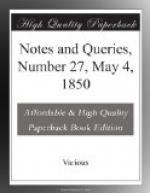“In der Statt waren
hoch Tueren und schoene Heueser von Silber und
Gold, und aller Hand leuet,
und die Frawen und Man naygten im
alle.”
Lastly, Jo. Morsheim in his Untreuer Frawen:—
“Das was mein Herr gar gerne hoert,
Und ob es Leut und Land bethort.”
Now, when we recollect the state of the people in those times, the serf-like vassalage, the Hoerigkeit or Leibeigenthum, which prevailed, we cannot be surprised that a word which signified possessions should designate also the people. It must still, however, be quite uncertain which is the secondary sense.
The root of the word, as Grimm justly remarks, is very obscure; and yet it seems to me that he himself has indirectly pointed it out:—
“Goth. liudan[3] (crescere); O.H.G. liotan (sometimes unorganic, hliotan); O.H.G. liut (populus); A.-S. leoeth; O.N. lioeth: Goth. lauths -is (homo), ju33alauths -dis (adolescens); O.H.G. sumar -lota (virgulta palmitis, i.e. qui una aestate creverunt, Gl. Rhb. 926’b, Jun. 242.); M.H.G. corrupted into sumer -late (M.S. i. 124’b. 2. 161’a. virga herba). It is doubtful whether ludja (facies), O.H.G. andlutti, is to be reckoned among them.”—Deutsche Gram. ii. 21. For this last see Diefenbach, Vergl. Gram. der Goth. Spr. i. 242.
In his Erlauterungen zu Elene, p. 166., Grimm further remarks:—
“The verb is leoethan, leaeth, luethon (crescere), O.S. lioethan, loeth, luethun. Leluethon (Caedm. 93. 28.) is creverunt, pullulant; and 3eloethen (ap. Hickes, p. 135. note) onustus, but rather cretus. Elene, 1227. 3eloethen unethep leapum (cretus sub foliis).”
It has been surmised that LEDE was connected with the O.N. hlyt[4]—which not only signified sors, portio, but res consistentia—and the A.-S. hlet, hlyt, lot, portion, inheritance: thus, in the A.-S. Psal. xxx. 18., on hanethum ethinum hlyt min, my heritage is in thy hands. Notker’s version is: Min loz ist in dinen handen. I have since found that Kindlinger (Geschichte der Deutchen Hoerigkeit) has made an attempt to derive it from Lied, Lit, which in Dutch, Flemish, and Low German, still signify a limb; I think, unsuccessfully.
Ray, in his Gloss. Northanymbr., has “unlead, nomen opprobrii;” but he gives a false derivation: Grose, in his Provincial Glossary, “unleed or unlead, a general name for any crawling venomous creature, as a toad, &c. It is sometimes ascribed to a man, and then it denotes a sly wicked fellow, that in a manner creeps to do mischief. See Mr. Nicholson’s Catalogue.”
In the 2d edition of Mr. Brockett’s Glossary, we have: “Unletes, displacers or destroyers of the farmer’s produce.”
This provincial preservation of a word of such rare occurrence in Anglo-Saxon, and of which no example has yet been found in old English, is a remarkable circumstance. The word has evidently signified, like the Gothic, in the first place poor; then wretched, miserable; and hence, perhaps, its opprobrious sense of mischievous or wicked.




